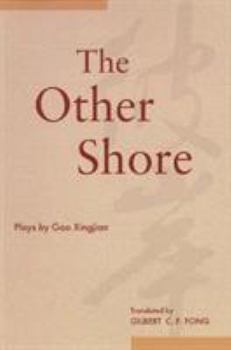The Other Shore: Plays
Select Format
Select Condition 
Book Overview
When Gao Xingjian won the Nobel Prize for Literature in 2000, he became the only Chinese writer to achieve such international acclaim. The Chinese University Press is the first publisher of his work... This description may be from another edition of this product.
Format:Paperback
Language:English
ISBN:9622018629
ISBN13:9789622018624
Release Date:June 1999
Publisher:Chinese University of Hong Kong Press
Length:312 Pages
Weight:1.00 lbs.
Dimensions:0.7" x 6.0" x 8.9"
Related Subjects
Contemporary Drama Eastern Education & Reference Ethnic Studies Fiction Foreign Language Study & Reference History & Criticism Humor & Entertainment Literary Criticism Literary Criticism & Collections Literature & Fiction Movements & Periods Politics & Social Sciences Social Science Social Sciences Specific Demographics World LiteratureCustomer Reviews
4 ratings
Nobel Press Release
Published by Thriftbooks.com User , 23 years ago
The Nobel Prize in Literature for 2000 goes to the Chinese writer Gao Xingjian"for an œuvre of universal validity, bitter insights and linguistic ingenuity, which has opened new paths for the Chinese novel and drama".In the writing of Gao Xingjian literature is born anew from the struggle of the individual to survive the history of the masses. He is a perspicacious sceptic who makes no claim to be able to explain the world. He asserts that he has found freedom only in writing. His great novel Soul Mountain is one of those singular literary creations that seem impossible to compare with anything but themselves. It is based on impressions from journeys in remote districts in southern and south-western China, where shamanistic customs still linger on, where ballads and tall stories about bandits are recounted as the truth and where it is possible to come across exponents of age-old Daoist wisdom. The book is a tapestry of narratives with several protagonists who reflect each other and may represent aspects of one and the same ego. With his unrestrained use of personal pronouns Gao creates lightning shifts of perspective and compels the reader to question all confidences. This approach derives from his dramas, which often require actors to assume a role and at the same time describe it from the outside. I, you and he/she become the names of fluctuating inner distances.Soul Mountain is a novel of a pilgrimage made by the protagonist to himself and a journey along the reflective surface that divides fiction from life, imagination from memory. The discussion of the problem of knowledge increasingly takes the form of a rehearsal of freedom from goals and meaning. Through its polyphony, its blend of genres and the scrutiny that the act of writing subjects itself to, the book recalls German Romanticism's magnificent concept of a universal poetry. Gao Xingjian's second novel, One Man's Bible, fulfils the themes of Soul Mountain but is easier to grasp. The core of the book involves settling the score with the terrifying insanity that is usually referred to as China's Cultural Revolution. With ruthless candour the author accounts for his experiences as a political activist, victim and outside observer, one after the other. His description could have resulted in the dissident's embodiment of morality but he rejects this stance and refuses to redeem anyone else. Gao Xingjian's writing is free of any kind of complaisance, even to good will. His play Fugitives irritated the democracy movement just as much as those in power.Gao Xingjian points out himself the significance for his plays of the non-naturalistic trends in Western drama, naming Artaud, Brecht, Beckett and Kantor. However, it has been equally important for him to "open the flow of sources from popular drama". When he created a Chinese oral theatre, he adopted elements from ancient masked drama, shadow plays and the dancing, singing and drumming traditions. He has embraced the possibility of moving free
Great Offerings from the Chinese Master
Published by Thriftbooks.com User , 23 years ago
Gao Xingjian's artistic sensibility was chiselled out of his double frustration of public condemnation and private shock. After being established as a prominent Chinese playwright, he suddenly fell out of grace of the communist authorities, who dubbed his works as `Spiritual Pollution'. At that time he was also undergoing an intense personal trauma, being diagnosed, wrongly, with lung cancer. He set out on an extensive journey to the heart of China covering 5 months and 15,000 kilometres which helped him rediscover his self and his countrymen and helped change his world-view. Although a direct outcome of this emotional journey was the phantasmogoric novel `Soul Mountain', the present five plays also bear testimony to his broadened horizon. In his plays the mythical finds place with the real, as he tries to make sense of the diversity of his land's culture and its people. Gao tries to mask the horrors of the Cultural Revolution in a set of highly original imagery. The symbolism sometimes obfuscates the proceedings, but the stark realism of the human drama comes back again and again. Some of Gao's views, on man woman relationship for instance, may not be palatable to the Western sensibility, but one has to understand the vast compass that he is handling in these plays. Out of the five plays `The Other Shore' and `Nocturnal Wanderer' are the most gripping. But all the five plays reflect the yearning of the individual to break lose from the stifling collective memory.
Nobel Prize 2000
Published by Thriftbooks.com User , 23 years ago
Gao Xingjian has received the Nobel Prize, 2000.
Rare Chinese Drama Acceptable For US Production
Published by Thriftbooks.com User , 23 years ago
Gao Xingjian has written some really provacative interesting drama for performance. The Other Shore is the best play available that presents the atmosphere and message of the horrors of the Maoism and the Cultural Revolution in a way that can be understood by people with no knowledge of Chinese history. Very interesting, Beckett-ish work just waiting to be performed.





